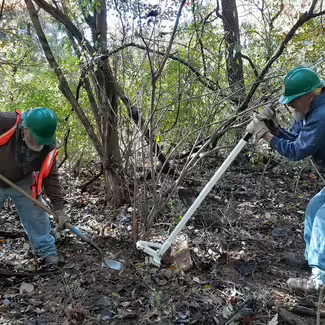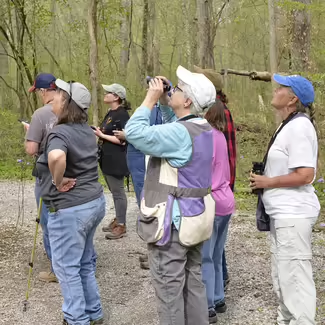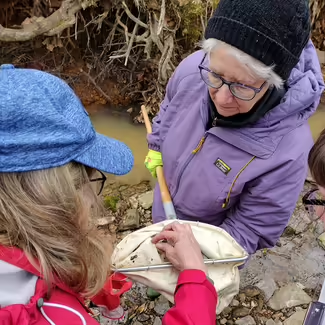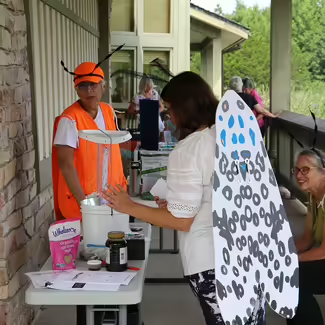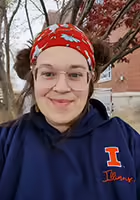
Master Naturalists
University of Illinois Extension's Illinois Master Naturalist Program is designed for adults of any age that want to learn about and positively impact their local environment. The goal of the program is to engage participants with the natural world and encourage them to seek lifelong learning opportunities to further their development as a naturalist.
Master Naturalist Program participants have the opportunity to:
- Learn about Illinois' natural history, ecosystems, plant and animal communities, and environmental issues
- Enhance your love of nature through hands-on training and community-based service,
- Practice lifelong learning and sharing
- Interact and build relationships with new acquaintances with similar interests
- Give something back to nature and your local community
- Learn from and work side-by-side with experts
To become a Certified Master Naturalist, you must complete 60 hours of field and classroom learning which is offered each spring. During and after training, you may begin working on the 60 hours of volunteer service required to complete your Master Naturalist internship. You have 24 months to complete your internship and become a certified Master Naturalist. To remain certified, an additional 30 hours of volunteer service and 10 hours of continuing education should be performed and reported annually.
The Illinois Master Naturalist program is coordinated by University of Illinois Extension, with consultation from local program partners.
When is the next training?
The hybrid Master Naturalist training will be held March 13 - May 22, 2026. In-person meeting dates will be on Fridays from 9am-3pm at Rend Lake Visitor's Center at 11981 Rend City Rd, Benton, IL 62812. Learning days will include hands-on activities, discussions, and application of knowledge gained from the online materials for each module. Guided hikes will take place in the field and be led by experts in the topic areas.
You will complete online, self-paced assignments between classes. These assignments include watching pre-recorded lectures, completing worksheets, completing online activities, and participating in a book club. Estimated time required to complete the self-paced assignments will be 3-4 hours per topic module, but this may vary based on your learning style. You will access the online portion of the course through Learn @ Illinois Extension.
What does the training involve?
The course will be completed in 10 weeks. A strong internet connection is highly recommended. This course is aimed at exposing participants to in-depth natural resources content through 16 modules including Environmental Ethics & Interpretation, Botany & Ecology, Geology, Soils, & Natural Divisions; Ornithology, Mammals, Wetlands, Rivers and Streams, & Aquatic Life; Prairies, Weather and Climate, Forestry, Invasive Species, Herpetology, Entomology and more. After finishing training, participants have the option to put their newfound environmental stewardship knowledge to use by applying to become an Illinois Extension Master Naturalist Volunteer.
What is the program fee?
The Illinois Master Naturalist course fee is $250, which covers:
- 8-12 week training, including over 60 hours of classroom instruction and field learning.
- Assistance in finding a volunteer position that fits your personal interests, abilities, and time restraints for as long as you remain a Certified Master Naturalist.
- Continuing-education events and opportunities.
Steps for joining?
- Reach out to Anne Townsend at 618-833-6363 or cupquake@illinois.edu to express your interest in joining the Master Naturalist program.
- Attend an informal interview.
- Complete a background screening process, which will take place through an online system called the Volunteer Gateway. This background screening includes:
- CANTS check through DCFS
- Background screening through Sterling Volunteers
- Registered sex offender check
- Extension Child Protection Training
- Three reference checks
- Complete required paperwork, like a risk waiver, photo release, code of conduct, and annual agreement.
- Pay $250 program fee.
- Complete the 10 weeks of training.
How to become certified?
After completing the training, participants will be Master Naturalist interns. To become fully certified, you must volunteer 60 hours through pre-approved volunteer projects. Volunteer projects can include invasive species pulls, herbarium specimen preparation, leading a nature hike, serving as a docent at a state park, stewardship work like trail maintenance and pollinator garden maintenance, assisting with educational programs for youth or adults, and much more.
How to remain active in the program?
Following the completion of an internship, participants are certified Master Naturalists. To remain active, volunteers must complete and log 30 hours of volunteer time and 10 hours of continuing education each year, as well as sign an annual agreement. Continuing education is continued learning from research-based sources on topics related to the natural world. Examples include webinars offered by University of Illinois Extension, talks from local nature groups, and more.

